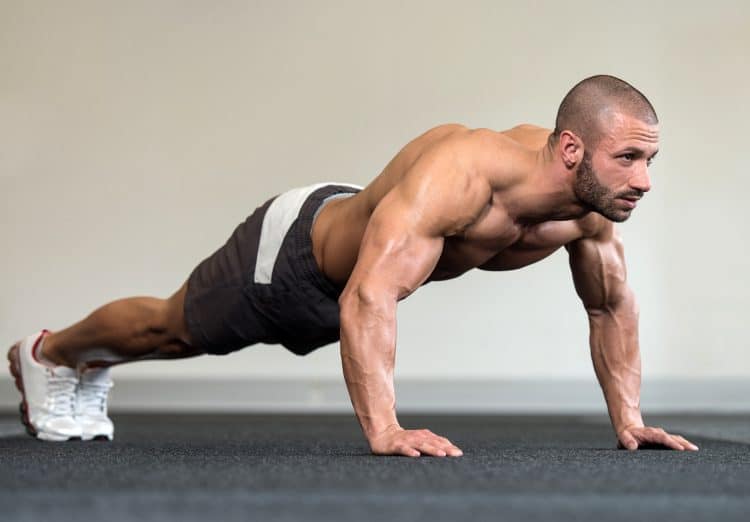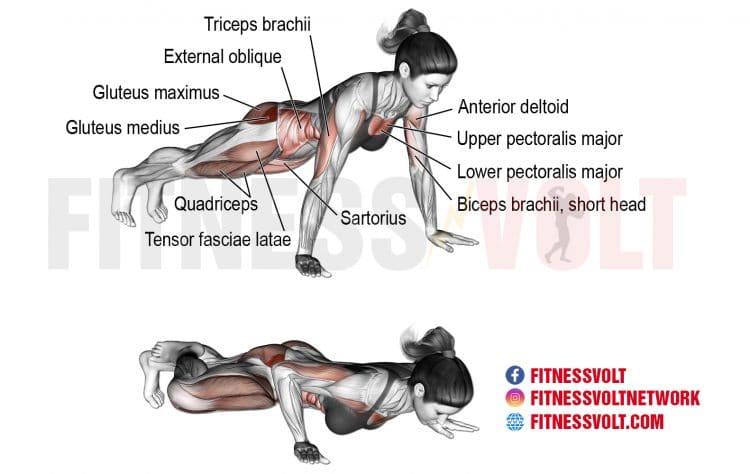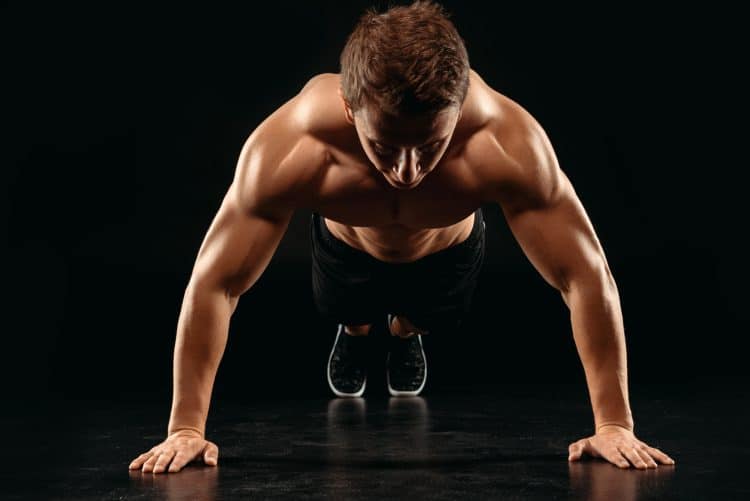Push-ups are one of the first exercises an individual learns to perform. You probably did your first push-up in school under the watchful eye of a PT teacher.
Push-ups are a functional exercise that primarily targets your chest and are an effective bodyweight exercise to build muscle mass and strength. However, some people, especially advanced lifters, brush it aside after labeling it a rookie exercise.
There are various reasons why most people do not exercise. Amongst other things, some believe that they cannot afford a gym membership or make time for the gym, while others think the weight room is only for narcissistic people who cannot stop checking themselves out in the mirror.
Notably, most of the reasons mentioned above are results of the illusory truth effect, meaning an individual repeats something so often that they start believing the statement to be true — even when it is not.
However, experts believe you don’t need any exercise equipment to stay in shape. Your body weight is enough to give you a good workout and boost your fitness level. And this is where the push-up shines.
[sc name=”style-summary2″ ]
- Target Muscle Group: Chest
- Type: Strength
- Mechanics: Compound
- Equipment: Bodyweight
- Difficulty: Beginner to Advanced
- Secondary Muscles: Abs, shoulders, and triceps
[/sc]
In this article, you’ll learn things about push-ups that’ll convince you to make the exercise a part of your daily ritual.
-
12 Reasons To Do Push-Ups Every Day
- 1. It is a Compound Movement
- 2. Builds Strength
- 3. Push-Ups Can Be Empowering
- 4. Modify the Exercise to Train a Specific Muscle Group
- 5. You Can Alter the Difficulty of the Exercise
- 6. Do Them Anywhere and Anytime
- 7. Improves Your Posture
- 8. Improve Your Flexibility
- 9. Push-Ups Can Enhance Your Core Strength
- 10. Enhances Your Joint and Bone Health
- 11. Can Improve Cardiovascular Health
- 12. Burns Calories
- How To Do a Push-Up
- Risks Involved
- Wrapping Up
- References
12 Reasons To Do Push-Ups Every Day
Here are 12 reasons why you should be doing push-ups every day:
1. It is a Compound Movement

Push-ups can help strengthen multiple muscles at once, including your chest, shoulders, triceps, biceps, upper back, and abs. Furthermore, to perform the exercise with a perfect form, you’ll have to keep your lower body contracted throughout the exercise.
It is a functional exercise, meaning it will help you improve at everyday activities. Plus, push-ups can boost your athletic and sports performance.
Related: The Best Compound Exercises
2. Builds Strength
Push-ups can be challenging, especially for beginners. Since push-ups engage your arms, pecs, shoulders, and abs, performing the exercise regularly can help build strength. Do not be surprised if you start seeing pectoral striations after a few weeks of starting your push-up regimen.
As you gain experience, you could take your gains to the next level by using additional resistance. You could perform weighted push-ups by placing weight plates on your back or use resistance bands to make the exercise harder.
3. Push-Ups Can Be Empowering
Besides helping you build upper body strength, push-ups can boost your confidence. There is something incredibly empowering about being able to push yourself up from the floor, holding your weight on your arms, and repeating it multiple times. Performing a push-up can make you feel confident, capable, and strong.
4. Modify the Exercise to Train a Specific Muscle Group
The push-up is a versatile exercise. You could change the target muscles by changing your hand placements, range of motion, and movement pattern.
For example, people trying to bring up their mid-chest could perform the decline push-up variation. On the other hand, folks targeting their pecs and core stability can try more advanced push-up variations like the TRX push-up. [1]
5. You Can Alter the Difficulty of the Exercise
Although push-up is a common exercise, they are not the easiest by any means. Lifting a majority of your body weight on your arms for multiple reps is no joke, after all.
Depending on your experience level, you can change the difficulty of the exercise. Beginners could make the exercise easier by performing push-ups on their knees or the wall push-up variation.
However, advanced lifters can up the ante with harder variations like the chaos push-up and incline plyo push-up.
Check Out: 15 Intense Push-Up Variations for Bodybuilders
6. Do Them Anywhere and Anytime
One of the best things about push-ups is that you do not need any equipment for the exercise, meaning you can perform the exercise at your convenience — when and where you deem fit.
You could perform them in the comfort of your bedroom or as a superset during a HIIT workout in the gym. Your imagination is your limit while incorporating the exercise into your daily routine.
7. Improves Your Posture
People with desk jobs spend most of their days hunched over a computer screen or phone, which can cause serious back and neck issues and lead to a bad body posture. Push-ups, if done with a correct form, can help counteract this by teaching your body good positioning.
Since you’re required to keep your body in a straight line during a conventional push-up, it can help improve your posture and balance. Make sure you are not lifting your chin or bending your neck while performing the exercise. Doing so can put unnecessary tension on your neck and spine.
8. Improve Your Flexibility

Following a full range of motion while performing the push-up engages almost every muscle fiber in your upper body. In a conventional pushup, as you lower yourself towards the floor, your back muscles are stretched, while on the way back, you achieve a stretch in your arms, shoulders, and pecs.
Furthermore, you could improve your flexibility by adding push-up variations like the spiderman push-up in your routine.
9. Push-Ups Can Enhance Your Core Strength
Performing a push-up requires you to keep your midsection contracted throughout the exercise, which helps build a stronger core.
A stronger core is the foundation for all strength work, which can also set off a virtuous cycle. A strong core can improve your performance in the gym, which can further make you stronger, leading to better workouts, and so on.
10. Enhances Your Joint and Bone Health

Contrary to what most people think, the benefits of push-ups aren’t only limited to muscle and strength building. The compound exercise can help build your body’s supportive structures by improving joint and bone health.
Per the National Institutes Of Health (NIH), weight-bearing exercises can help build strong bones and slow bone loss.
Since push-ups rely on your elbows and shoulders, performing the exercise regularly will help strengthen your joints over time and build bone density. Furthermore, push-ups are particularly effective at strengthening muscles around the shoulder joints.
11. Can Improve Cardiovascular Health
Anybody who has performed more than 20 push-ups in a go will attest they are an effective way of spiking your heart rate. While push-ups primarily help build muscle mass and strength, they can also improve cardiovascular health.
Push-ups can be a great addition to any high-intensity interval training (HIIT) routine to boost your heart rate and burn calories while achieving muscle hypertrophy.
A 2019 study found that men who could do at least 40 push-ups in 30 seconds were at a lower risk of contracting cardiovascular issues (including heart attack and failure) than men who were able to complete 10 push-ups or less. [2]
12. Burns Calories
Adding push-ups to your daily routine can help boost your metabolic rate, which can help burn more calories than you would if you were not performing them every day.
Check out our calories burned while doing push-ups calculator.
How To Do a Push-Up
Now that you know why push-ups should be a part of your daily routine, you must nail down your exercise form to get the best bang for your buck.
Here is how to perform the push-up with the correct form:
- Assume a quadruped position on the floor with your hands under your shoulders and knees under your hips.
- Get into a planking position with arms, legs, and elbows extended and head in a neutral position looking at the floor.
- Lower your upper body towards the floor by bending at your elbows and retracting the shoulder blades.
- Descend until the upper arms are parallel or your chest touches the floor.
- Return to the starting position explosively by extending at your elbows and pushing up.
- Pause and contract at the top.
- Repeat for recommended repetitions.
Next Read: 13 Next Level Push-Up Variations For Mass, Strength, and Performance
Risks Involved
Although performing push-ups every day has several benefits, it comes with a few risks you should know about, including:
Overstressing Your Joints and Bones
This issue is not just limited to push-ups. You could overwork your joints if you do repetitive work, even at work. Tennis elbow and forearm splints are a few common issues related to overworking your tendons and bones.
Hitting a Plateau
You could hit a muscle and strength plateau after a few months of performing conventional push-ups. To avoid hitting a plateau, you need to switch up your training routine consistently to ensure you are shocking your muscles into growing.
Progressive overloading your muscles is one of the most efficient ways of ensuring consistent muscle and strength gains. For progressive overloading, you could perform more reps in a workout than what you did during the previous week or use additional resistance.
Related: 4 Methods For Busting Through Lifting Plateaus
As you might have figured, while there are risks associated with performing push-ups every day, the benefits far outweigh the drawbacks.
Wrapping Up
Push-ups are an incredibly versatile exercise that should be a part of every individual’s daily routine, especially people who do not lift weights.
Make sure you’re performing the exercise with the correct form and incorporating different variations into your routine to ensure you don’t hit a plateau.
References
- Marcolin G, Petrone N, Moro T, Battaglia G, Bianco A, Paoli A. Selective Activation of Shoulder, Trunk, and Arm Muscles: A Comparative Analysis of Different Push-Up Variants. J Athl Train. 2015;50(11):1126-1132. doi:10.4085/1062-6050-50.9.09
- Yang J, Christophi CA, Farioli A, et al. Association Between Push-up Exercise Capacity and Future Cardiovascular Events Among Active Adult Men. JAMA Netw Open. 2019;2(2):e188341. doi:10.1001/jamanetworkopen.2018.8341


